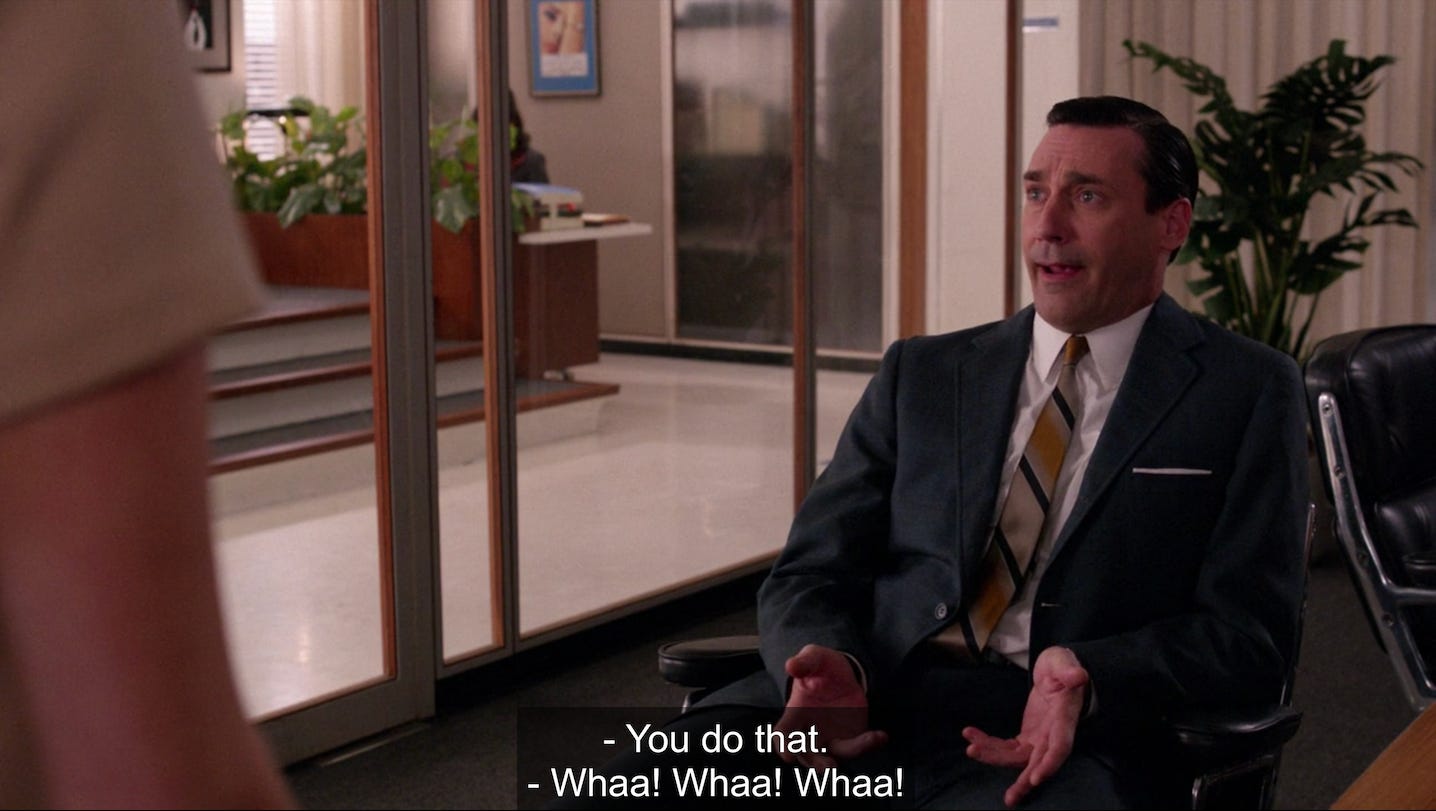Not Great, Bob!
You can read this if you want to—it's not really important in the grand scheme of things
Here's the thing: I joke about this, but I really do want to talk about Mad Men. Not for that long, I promise.
I keep trying to get my sister to watch it, but her standard response is, "Why would I watch a show about white people in the ‘60s?" That is...true! I cannot refute that with any solid evidence. And I surely can't blame anyone for not wanting, in this moment, to watch a show about wealthy, privileged white people in the ‘60s.
On my current rewatch, however, in the aforementioned cultural moment, I am finding Mad Men to be the near-perfect prism through which to refract all my anxieties about the world around us. There are probably more urgent Marxist texts to read, more informative Adam Curtis documentaries I need to watch. A recent essay I read about the show used the adjectives "sturdy...built to last." I like that description a lot.

Because that is also true! Mad Men is, to my mind, about how people go about their daily lives when it seems like the world outside is falling apart. You wake up, go to work, take a seat at your desk job, try to make a career for yourself, drink too much gin and smoke too many Lucky Strikes, come home to your family, and then watch the news tell you the world is going to shit. Then you go to sleep, just to try it out again tomorrow.
It feels like that's all I've been doing—just trying it out again tomorrow. The world is fucked. You can choose what you want to learn more about every morning: wildfires, hurricanes, police brutality, COVID deaths, unemployment levels, Muslim detention camps, the civil war in Yemen, this monstrosity. And at the end of the day, after you've done your due diligence, what else is left? You go along with your life, sending out your stupid little emails and listening to podcasts on your daily walk. There is only so much Hollywood Handbook you can consume to to try to force some sense of normalcy into your life.
In Mad Men, we have a protagonist, Don Draper, who is the perfect emblem of idealized American exceptionalism, in both the man and his profession—nostalgia and "the way things were" repackaged and buffed up to seem shiny and new, while the body rots from within. America “as it was” is a lie the country tells itself. What the show implies is that the notion that the American worker can compartmentalize their life into "Work" and "Not Work" is also pure fantasy; every facet of your existence, every choice you make and interaction you have, whether explicitly or not, is defined by what's happening around you. You take in the horrors of society at-large and you try to file them away to dutifully provide your services to the American experiment. But the inevitable truth of having a job, of being alive, during any era of great cultural upheaval, is that nothing is—and nothing ever was—mutually exclusive. You can’t leave politics at the door; you can’t stick to sports. The particulars of your life do not exist in a vacuum. Don watches fear-mongering Nixon campaign ads that warn of race riots destroying American cities, while still dealing with the fallout of his daughter walking in on one of his many extramarital affairs; I am feeling unbearably anxious about the fire complexes in Northern California while also wondering why it stung a little bit when I peed the other day. These are the same things.
I believe in the ‘60s as a robust point of comparison for today, and I trust Mad Men as a way to interpret it. Because the show tells you the truth: all we do, every day, is try to go about our personal lives when it feels like the world is telling us we shouldn't be.
Here's the most distressing thing I read this week. And some places you could donate:
Ritam’s Footnote
Mad Men? These men look perfectly composed to me.


